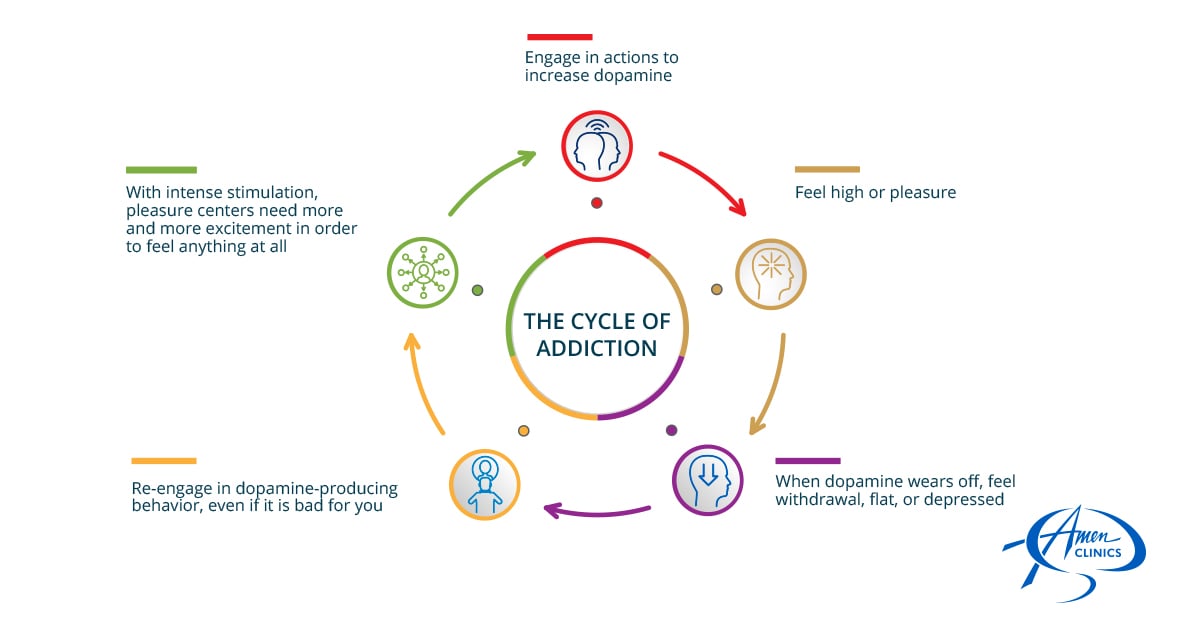Many famous performers have experienced worldwide fame, which releases massive amounts of dopamine, stimulating their pleasure centers over and over as strangers recognize them everywhere they go, often begging for autographs or screaming their names. Repeated, intense activation of the pleasure centers wears them out, much like a cocaine high that lessens with frequent use of the drug.
Over time, if these stars are not careful, it takes more and more dopamine-producing activities—more fame, falling in love, affairs with multiple partners, drugs, racing cars, and even stealing—just to feel normal or not to feel depressed.
Pleasure Centers
If the pleasure centers become damaged by overuse, toxins, or head trauma, or if dopamine is excessively high for prolonged periods, the ventral tegmental area, nucleus accumbens, and basal ganglia become less responsive. The dopamine high stops being as intense as it once was. This increases the risk of depression—or addiction to substances that people turn to in order to fix the bad feelings caused by the numbing of these brain regions.
The addictive substances include nicotine, alcohol, methamphetamines, cocaine, pornography, and food (specifically, foods high in sugar and fat). When a powerful release of dopamine hits the pleasure centers, increases euphoria, and then wears off, people can feel flat or depressed and start craving a way out of the bad feelings. As a result, they reengage in the actions that intensely ramped up their dopamine levels in the first place. Over time, it takes more and more of the substance to get the same response. This is the cycle of addiction.
The Cycle of Addiction

Many forces in our changing society, besides fame, are putting excessive demands on our pleasure centers. When dopamine wears off, experience withdrawal, leaving you feeling flat or depressed pleasure centers in the same way that cocaine does. We all know people who are glued to their smartphones even while they are talking to others. For these people, every time their devices ping to signal a new incoming message, it causes a small release of dopamine.
Entertainment & Dopamine
Television is all about “breaking news” and quick, high-intensity action. Dopamine is constantly released in video gamers as they play, and the games were specifically designed to hook your attention. As video game and technology usage goes up, so do depression and obesity.
In short, our devices, online communities, games, TV-watching habits, and scary movies are wearing out our pleasure centers and changing our brains. Our fast-paced, pleasure-seeking lifestyle is robbing us of the ability to experience joy from the simple things in life. Things that once made us happy—such as a smile from a friend, a glorious sunset, or a great tennis match—have lost the power to move us. Our excessive pursuit of constant thrills may contribute to emotional problems, such as depression and anxiety, as well as addictions to drugs, alcohol, Internet gambling, pornography, and compulsive shopping.
Video Games
Even new love, for millennials at least, has turned into a video game. Amen Clinics collaborated with The Dr. Oz Show on a brain imaging–Tinder experiment with several thirtysomething men and women to determine the effect of the dating app on mood and focus. If they were lucky enough to get a “swipe right”—meaning someone using the dating app liked their pictures and short bio—it increased activity in the pleasure and mood centers of their brains. If, however, there were fewer “swipes right” and more “swipes left,” indicating rejection, their brains were more vulnerable to pain and depression.
How to Protect Your Pleasure Centers
With so many diversions in our lives that have the potential to negatively affect our pleasure centers and keep us from experiencing purpose and passion for the things we value most, we need to act. Here are some simple steps to take to protect your pleasure centers and keep them healthy:
• Limit or eliminate the use of constantly stimulating devices and activities, such as smartphones, gaming, shopping, pornography, scary movies, and high-risk activities.
• Engage in regular physical exercise, especially something you love that does not endanger your brain, such as dancing, swimming, or tennis.
• Meditate—it protects the brain while enhancing a sense of well-being.
• Make time to laugh—humor enhances the pleasure centers without wearing them out.
• Connect meaningful activities with pleasure, such as volunteering for activities you love.
• Start every day by thinking of three things for which you are MINUTES grateful (a small dopamine drip) and one person you appreciate, then reach out through text or e-mail.
• Seek pleasure in the little things in your life, such as a walk with a friend, holding hands with your spouse, a great meal, or a meaningful church service.
• Eat foods that contain dopamine-boosting properties, such as chicken, turkey, seafood, almonds, pumpkin and sesame seeds, turmeric, oregano, vegetables (for folate and magnesium), olive oil, and green tea.
• Consider supplements to support dopamine, such as omega-3 fatty acids, SAMe, and green tea extract.
At Amen Clinics, we’re committed to treating our patients with the least toxic, most effective regimen. For more information about you can start to get on track today, we recommend reading Dr. Amen’s new book, “Feel Better Fast and Make It Last.” You can order the book by clicking here.
For more information on how SPECT imaging can help provide a customized treatment plan to help heal your brain, call us today at 888-288-9834 or visit us online to schedule a visit.
